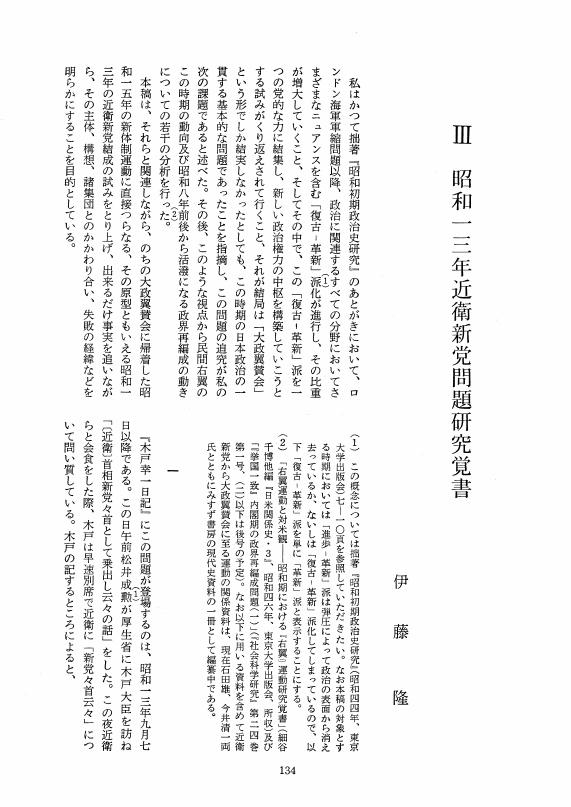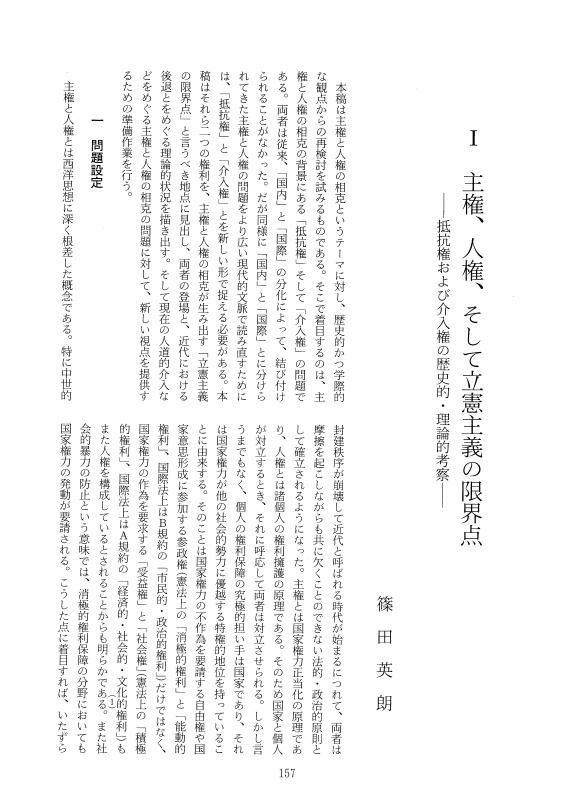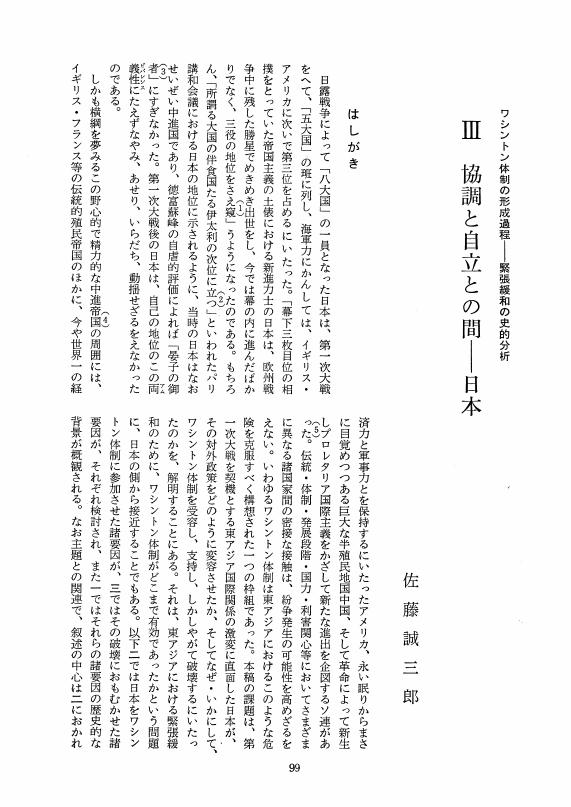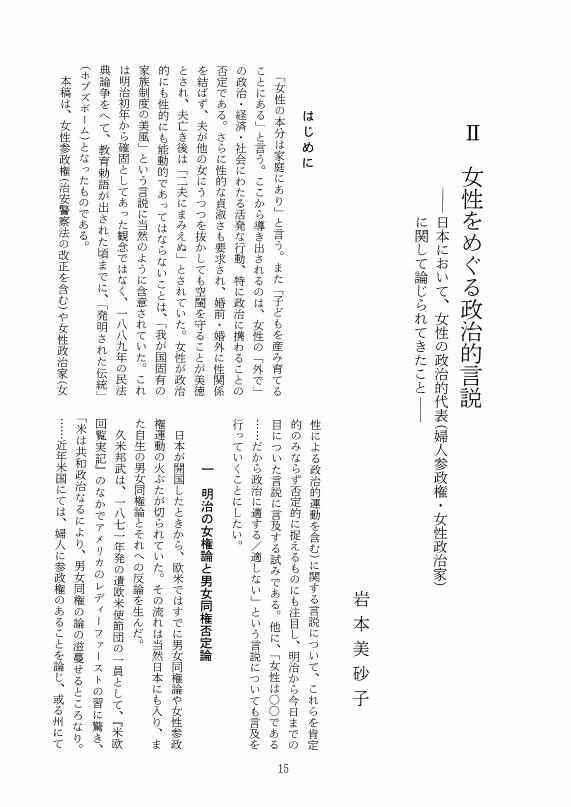1 0 0 0 OA 「民本主義」の歴史的形成
- 著者
- 松本 三之介
- 出版者
- JAPANESE POLITICAL SCIENCE ASSOCIATION
- 雑誌
- 年報政治学 (ISSN:05494192)
- 巻号頁・発行日
- vol.8, pp.109-131, 1957-03-20 (Released:2009-12-21)
- 参考文献数
- 8
1 0 0 0 OA 第三世界の政治学 I
- 著者
- 森 利一
- 出版者
- JAPANESE POLITICAL SCIENCE ASSOCIATION
- 雑誌
- 年報政治学 (ISSN:05494192)
- 巻号頁・発行日
- vol.27, pp.121-157,en6, 1977-03-31 (Released:2009-12-21)
This study aims at analyzing the political dynamics of developing countries with the concept of the ‘Third World.’ It seems, however, the analytical method for the study of the politics of the Third World has not yet been established.In the past, studies of Asia, Africa, and Latin America in Japan centered around the nationalist movements, internal politics, and the international relations among countries in these areas, while little effort has been attempted to characterize the politics of the Third World seen as a whole.One of the features of the political situation of the Third World, as the writer observes it, is instability brought about by various factors—geographical, cultural, historical, ideological—entangled in international settings.Another feature can be seen in the political systems being transitional. Many instances have taken place in which the revolutionary council established as the consequence of a military coup proceeds toward a socialist state. The writer assumes that such circumstances will lead the military in power to dictatorship.In his analysis the writer shows a critical attitude to the military who are in most cases apt to reinforce armaments. The writer presumes that this attitude has, at the same time, something in common with his standpoint against the military expansion race between the two nuclear-armed superstates.The writer presents in this study a new approach to the political analysis of the Third World with an orientation backed up by the definite value judgment which is based on contemporary peace research.
1 0 0 0 OA 事業廃止の政治学
- 著者
- 砂原 庸介
- 出版者
- JAPANESE POLITICAL SCIENCE ASSOCIATION
- 雑誌
- 年報政治学 (ISSN:05494192)
- 巻号頁・発行日
- vol.59, no.2, pp.2_237-2_257, 2008 (Released:2012-12-28)
- 参考文献数
- 18
This article analyzes how Japanese local governments decide to terminate policy programs, by examining the experiences of terminating dam construction in prefectural governments. Though Japanese local governments are commonly regarded as subordinate to the central government, they are granted considerable autonomy to implement investment programs. In fact, after the last half of 1990s, many prefectural governments have decided to terminate investment programs, such as dam construction programs which this article deals with. The author advances several hypotheses that the election system of local governments affects the motivations of politicians to implement dam construction programs, and examines those hypotheses by using the techniques of Event History Modeling. The empirical results of this article suggest that a change of local governor is the most important factor of policy termination and that the local assemblies which tend to oppose to the governor become substantive resistance force against termination. These findings demonstrate that the policy termination is not only economical or technical decision, but highly political decision.
1 0 0 0 OA 「政治学の実践化」への試み
- 著者
- 小野 耕二
- 出版者
- JAPANESE POLITICAL SCIENCE ASSOCIATION
- 雑誌
- 年報政治学 (ISSN:05494192)
- 巻号頁・発行日
- vol.57, no.2, pp.178-201,266, 2006 (Released:2010-04-30)
The aim of this paper is to introduce new trends within theories of Political Science, to attempt to nudge the discipline of Political Science into a more practical direction, and also to clarify the significance of the Asian Legal Assistance Project, currently being carried out by the Graduate School of Law at Nagoya University. Firstly, Political Science is often referred to as “the discipline divided, ” but this situation has seen a degree of change recently. There are sincere discussions and interactions among the three kinds of Institutionalism in search of fruitful cooperation. To demonstrate this dialogue, I introduce some books as good examples. Secondly, a number of political scientists have started projects to apply their knowledge to the solving of practical political issues. I introduce the book Democracy at Risk as an example of this. Democracy at Risk is a report by the Standing Committee on Civic Education and Engagement of the American Political Science Association. It tests the proposition that modern political science has useful insights into the state of democratic life and what might be done to improve it. Thirdly, I evaluate the Asian Legal Assistance Project which was commenced by the Graduate School of Law at Nagoya University as one of the practical projects organized by Japanese social scientists. The aim of this project is to establish modern legal systems within the Graduate School's target countries, including Vietnam, Laos, Cambodia, Mongolia, and Uzbekistan. This project aims at assisting the transition from planned to market economies of these countries. While this is still a very new project, I think it shows a possible future direction for fruitful cooperation between practitioners and academicians within legal and political sciences.
1 0 0 0 OA 自由民主党の党首選出手続きルールと派閥権力
- 著者
- 田中 善一郎
- 出版者
- JAPANESE POLITICAL SCIENCE ASSOCIATION
- 雑誌
- 年報政治学 (ISSN:05494192)
- 巻号頁・発行日
- vol.36, pp.1-33, 1986-03-28 (Released:2009-12-21)
1 0 0 0 OA 自由主義の変容と大衆社会
- 著者
- 石上 良平
- 出版者
- JAPANESE POLITICAL SCIENCE ASSOCIATION
- 雑誌
- 年報政治学 (ISSN:05494192)
- 巻号頁・発行日
- vol.8, pp.29-55, 1957-03-20 (Released:2009-12-21)
1 0 0 0 OA 総合安全保障論の文脈 -権力政治と相互依存の交錯-
- 著者
- 中西 寛
- 出版者
- JAPANESE POLITICAL SCIENCE ASSOCIATION
- 雑誌
- 年報政治学 (ISSN:05494192)
- 巻号頁・発行日
- vol.48, pp.97-115, 1997-12-10 (Released:2009-12-21)
1 0 0 0 OA 昭和一三年近衛新党問題研究覚書
- 著者
- 伊藤 隆
- 出版者
- JAPANESE POLITICAL SCIENCE ASSOCIATION
- 雑誌
- 年報政治学 (ISSN:05494192)
- 巻号頁・発行日
- vol.23, pp.134-180, 1973-03-30 (Released:2009-12-21)
1 0 0 0 OA 主権、人権、そして立憲主義の限界点
- 著者
- 篠田 英朗
- 出版者
- JAPANESE POLITICAL SCIENCE ASSOCIATION
- 雑誌
- 年報政治学 (ISSN:05494192)
- 巻号頁・発行日
- vol.52, pp.157-169, 2002-01-30 (Released:2009-12-21)
1 0 0 0 OA ホッブズ-リヴァイアサンと平和概念の転換-
- 著者
- 佐藤 正志
- 出版者
- JAPANESE POLITICAL SCIENCE ASSOCIATION
- 雑誌
- 年報政治学 (ISSN:05494192)
- 巻号頁・発行日
- vol.43, pp.19-34, 1992-12-22 (Released:2009-12-21)
1 0 0 0 OA ロシヤ帝国主義のイデオロギーとしての汎スラヴ主義
- 著者
- 勝田 吉太郎
- 出版者
- JAPANESE POLITICAL SCIENCE ASSOCIATION
- 雑誌
- 年報政治学 (ISSN:05494192)
- 巻号頁・発行日
- vol.12, pp.57-89, 1961-04-26 (Released:2009-12-21)
1 0 0 0 OA 協調と自立との間-日本
- 著者
- 佐藤 誠三郎
- 出版者
- JAPANESE POLITICAL SCIENCE ASSOCIATION
- 雑誌
- 年報政治学 (ISSN:05494192)
- 巻号頁・発行日
- vol.20, pp.99-144, 1970-05-30 (Released:2009-12-21)
1 0 0 0 OA 2007年度 書評
- 著者
- 日本政治学会書評委員会
- 出版者
- JAPANESE POLITICAL SCIENCE ASSOCIATION
- 雑誌
- 年報政治学 (ISSN:05494192)
- 巻号頁・発行日
- vol.59, no.1, pp.1_324-1_343, 2008 (Released:2012-12-28)
1 0 0 0 OA 国家社会主義の発想様式
- 著者
- 橋川 文三
- 出版者
- JAPANESE POLITICAL SCIENCE ASSOCIATION
- 雑誌
- 年報政治学 (ISSN:05494192)
- 巻号頁・発行日
- vol.19, pp.104-138,228, 1968-09-30 (Released:2009-12-21)
It is generally known that a country trying to modernize itself in a short space of time is often confronted with the problem of fulfilling two divergent requirements at the same time. On the one hand it must establish a powerful state to exercise effective control over industrialization, and on the other hand it must deal with the popular demands for economic equality which are caused by the profound changes in social life. Just out of such twofold necessities, there are born varied types of national (or state) socialism, which aim in any case at the synthesis of nationalism and socialism.One of the most early exponents of such ideas in Japan, was perhaps Kazuteru Kita, who in his first work on “National Polity and Genuine Socialism” tried to interpret the new ideals of socialism in terms of traditional values. In this article, we first examine the contents of this book, and show how Kita combined the idea of socialism with that of nationalism. He was a young socialist, but he was an ardent patriot and an admirer of the Emperor Mneiji as well. He believed in the truth of socialism, but he sought some principle which could do justice to his own romantic view of the royal traditions. He found in the doctrine of evolution the very tenet which could satisfy in somewhat mystical way both the demand for socialism and that for patriotic nationalism. In brief, he was a socialist caught in the toils of the evolutionist conception.Takabatake was another example of a socialist who tried to demonstrate that a true socialist should be of necessity a true nationalist. Unlike Kita, he was a true disciple of Marx, and translated the voluminous “Kapital” into Japanese for the first time in this country. He studied the Marxian theory on state in detail, and found that both Marx and Engels were not right when they thought that the state would disappear or die away after the communist revolution. On the contrary, Takabatake asserted that the state would recover its own genuine function after the abolition of classes, since the existing state is only an instrument in the hand of the capitalist class to exploit the suppressed people, and was thus not a genuine state.He tried to formulate his own theory of state on the premise that the masses were seeking instinctively both for a powerful government and for socialistic equality, especially in the era after the World War I. He knew more profoundly than any one that the socialization of the state and the nationalization of socialism were inevitable in the middle of 20th century.
1 0 0 0 OA 汚職と経済発展のパラドックス
- 著者
- 堀金 由美
- 出版者
- JAPANESE POLITICAL SCIENCE ASSOCIATION
- 雑誌
- 年報政治学 (ISSN:05494192)
- 巻号頁・発行日
- vol.60, no.1, pp.1_322-1_344, 2009 (Released:2013-02-07)
- 参考文献数
- 60
- 被引用文献数
- 1 1
Most of recent statistical studies show corruption is incompatible with rapid economic development. In South Korea, however, the miraculous economic growth was attained despite the existence of ample corruption. This paper tries to explain this riddle through deductive exploration of the rational behavior of bureaucrats in the Korean institutional framework. The model assumes that there were various types of bureaucrats, yet all of them were basically rational utility maximizers, competing with each other for promotion regardless of their official or personal purposes and propensities. The rule was clearly defined within the newly-established merit-based civil service system, and all they had to do there, in fact, was to make greater contribution to the leadership's ultimate target of economic development. Under the extremely goal-oriented public administration of the developmental state, the performance of the economy was always closely monitored and regularly reported, by which the performance of the relevant bureaucratic agencies as well as that of the persons in charge was revealed. In other words, bureaucrats, regardless of their individual interests, always needed to achieve good performance in order to be promoted. Even if they were corrupt, their corruption should not gravely hinder the good performance.
1 0 0 0 OA 明治社会主義の思想
- 著者
- 松沢 弘陽
- 出版者
- JAPANESE POLITICAL SCIENCE ASSOCIATION
- 雑誌
- 年報政治学 (ISSN:05494192)
- 巻号頁・発行日
- vol.19, pp.5-62,230, 1968-09-30 (Released:2009-12-21)
Most of the socialists in the Meiji era were born in the 1860s, at the dawn of a new era, and grew up along with the new regime. Thus they were devoted to and were proud of the Meiji regime. When they later began to perceive social evils, they sought to reform but not to reject the regime.The early 1890s saw the modern beaureaucracy and higher education system prematurely established, which were followed by the rapid industrialization after the Sino-Japanese war. What resulted was a rigid social differentiation and opportunities to climb the ladders narrowed, at least this seemed so to ambitious young people. Moral sentiments declined. “Social problems” began to be conceptualized and given great weight. Many idealistic young intellectuals, inspired by democratic sentiments but prevented from climbing the ladder to success, approached “social problems” from the viewpoint of Wstern social and socialist theories which were learned mostly from American socialist literature. By introducing socialist reform they tried to dissipate the threat to the Meiji regime, particularly its constitutional aspect. They followed the German social democratic party which was the object of their deep admiration and almost the same with “International Socialism” itself to them. Nevertheless, the Japanese socialists were too deeply rooted in the native soil for them to be swallowed up by Western social and socialist theories. They interpreted and, though unconsciously, modified them, in terms of their own ways of thinking.Moreover we must remember that each socialist had a different social and cultural background from those of others. This resulted in different interpretations and modifications of western theories. On the one hand there was a “middle class” socialism of political journalists, “middle class” members themselves, who had been immersed in the ethos of the Restoration loyalist warrior (“shishi”) and of the literati (“bunjin”), and they laid much stress on the parliamentary side of an “elite socialism”. On the other hand there was a socialism of a trade union organizer, who tried to rely on the ethos of the “independent peasant” (“tokuno”) and of the skilled craftsman (“shokunin”), working by the sweat of their brows. He sought in his reform activities to improve people's way of life, not only their standard of living but their civic spirit and organizational efforts through their own participation.The Russo-Japanese war spelled the end of their efforts. Standing firm in their belief in international peace and justice they rejected the war aim of the Meiji government. The result was severe oppression by the government and castigation by public opinion. Faced with these difficulties, the dissension already creeping in became serious. In addition the socialists as a whole began to be isolated from the people. The plot of the “High-Treason Incident” finally put an end to the short life of the “Meiji socialists”.
1 0 0 0 OA メキシコにおける現代権威主義国家の形成
- 著者
- 加茂 雄三
- 出版者
- JAPANESE POLITICAL SCIENCE ASSOCIATION
- 雑誌
- 年報政治学 (ISSN:05494192)
- 巻号頁・発行日
- vol.29, pp.99-118, 1980-03-26 (Released:2009-12-21)
1 0 0 0 OA 思想形成期の田中耕太郎
- 著者
- 半澤 孝麿
- 出版者
- JAPANESE POLITICAL SCIENCE ASSOCIATION
- 雑誌
- 年報政治学 (ISSN:05494192)
- 巻号頁・発行日
- vol.26, pp.208-240, 1976-03-30 (Released:2009-12-21)
1 0 0 0 OA 占領初期の沖縄における政軍関係
- 著者
- 我部 政男
- 出版者
- JAPANESE POLITICAL SCIENCE ASSOCIATION
- 雑誌
- 年報政治学 (ISSN:05494192)
- 巻号頁・発行日
- vol.40, pp.47-73, 1990-03-29 (Released:2009-12-21)
1 0 0 0 OA 女性をめぐる政治的言説
- 著者
- 岩本 美砂子
- 出版者
- JAPANESE POLITICAL SCIENCE ASSOCIATION
- 雑誌
- 年報政治学 (ISSN:05494192)
- 巻号頁・発行日
- vol.54, pp.15-44, 2003-12-25 (Released:2009-12-21)
- 被引用文献数
- 1













